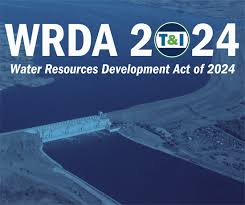- December 13, 2024
- Posted by: Jackie Arboleda
- Category: Federal

By: LSN Partners
This week, the House passed the Water Resources Development Act of 2024 (WRDA), the biennial water infrastructure reauthorization bill, sending it to the Senate to clear for the president’s signature. The agreement between House and Senate committee leaders passed as an amendment to the Senate bill (S. 4367) on a 399-18 vote. All ‘no’ votes were from Republicans. The measure would authorize about $3.3 billion in new construction projects, redistribute unobligated funds for transportation projects to the states, and reauthorize the Economic Development Administration.
Since its inception, the federal government has helped develop and maintain ports, harbors, and waterways in the United States to facilitate navigation and promote commerce. Operating through the U.S. Army Corps of Engineers, the government has also protected communities against floods by building dams and levees.
This bill authorizes the construction of new water projects by the Corps of Engineers and feasibility studies for future projects. It extends and modifies the authorizations of existing projects and corps programs and deauthorizes others. It includes numerous policy provisions, such as lowering the local cost share for developing deeper ports and harbors and enabling corps recreation facilities to keep and use the recreation fees they collect.
The bill authorizes 21 new projects for construction and 162 new feasibility studies, as well as 40 feasibility studies for modifying existing projects. It adds more than 190 environmental infrastructure projects to existing authorizations — including projects to address water, wastewater, water supply, and stormwater management — and authorizes $3.3 billion in new funding for those projects. The bill modifies 64 existing projects to authorize an additional $1.6 billion for environmental infrastructure.
The measure will reauthorize the Economic Development Administration within the Commerce Department and various regional commissions similarly intended to spur economic development for five years, through FY 2029.
Finally, the bill redistributes unobligated Transportation Infrastructure Finance and Innovation Act (TIFIA) funds to states through the Surface Transportation Block Grant program. It also requires the General Services Administration to sell specific unused federal property and consider consolidating or offloading federal buildings unless at least 60% of the building’s federal workers return to the office.